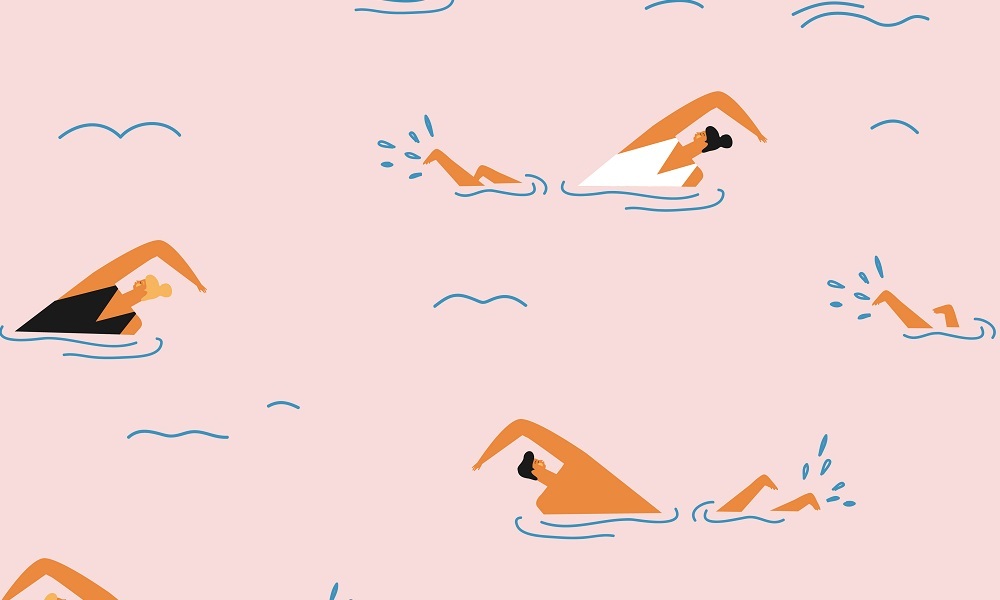As a nation surrounded by water, Australians of all ages swim to keep fit and healthy, and as a form of relaxation.
Swimming is one of the most popular sports in Australia for adults and children alike (Eime et al, 2020). It is a low-impact activity that has a multitude of physical and mental health benefits. It helps to build endurance, muscle strength and cardiovascular fitness, while also toning muscles and building strength. It can also help to maintain a healthy weight, heart and lungs (Better Health Channel, 2013).
Dr Rebecca Olive is a Senior Research Fellow (ARC DECRA) in the School of Human Movement and Nutrition Sciences at the University of Queensland. Over the past few years, she’s been working on a research project called Moving Oceans, looking at the role of sport, physical activities and leisure in how we come to care for oceans and coasts. It explores the everyday relationships we develop through surfing, swimming and other ocean lifestyle sports.
Olive says there are lots of ways that ocean swimming impacts our physical health. ‘It’s really good for us in terms of just getting out and doing movement,’ she tells Wellbeing by Teacher. ‘The other thing is we often go for a walk to get to the swimming spot – the swims I do are about a kilometre walk down the beach and we’ll swim back across the bay – so you’re also walking as part of that too.’
Throughout history, communities have used seawater for medical purposes, or thalassotherapy. ‘The understanding that it’s good for us is so mainstream but in some countries they prescribe for people’s health and mental health in particular,’ Olive says.
‘In the ocean, looking at the expanse and the horizon and feeling the water against us, it’s really good for our mental health in the sensations that we feel, the colours that we see, the literal perspectives. When you look at an ocean it’s looking at space and it makes you feel quite small and I find that humbling in a productive way. It kind of puts things into perspective,’ she says.
Why swimming is good for the ocean, too
‘We know pretty fundamentally that going out and doing physical activity in nature spaces, in the outdoors, is really good for us. We know that. It’s accepted in a very mainstream way. But, I’m interested in whether it’s good for nature in return,’ Olive says.
As part of her research, Olive is exploring how swimming in the ocean helps us to understand it better and want to take care of it, and how this changes our behaviour. For example, those who spend time in the ocean may notice more plastic floating around, or they may notice animals that are impacted by pollution, and feel compelled to use less plastic in their everyday lives.
‘When you spend a lot of time in a space, you get to know it better and that helps you understand the changes that are happening to it. But also, we care for the things we have a relationship to. When we think about caring for the planet, in some ways it becomes quite abstract, it’s so big it’s hard to think about what we can do because what we do in our everyday lives seems so small in relation to the problem,’ Olive shares.
‘So not using a takeaway coffee cup or not using a straw, that seems so pointless, making that change. But when it’s actually in your face, in your every day and you go, “well me making these changes has an impact on these places that I love and that I swim in” – it feels much more real.’
Regular ocean swimmers will often wax lyrical about the wildlife they encounter while out at sea. Olive says this is reflected in her research as well.
‘In my swimming groups, the first thing people talk about when they get in is what animals they encountered on their swim and they take so much joy, from it. They go, “Oh I saw a leopard shark” or “I saw an eagle ray” and they’re thrilled and I feel that too,’ Olive shares.
‘Sometimes you have these quite special encounters too where maybe you’ve floated above a turtle and it’s not swimming away and maybe it came and looked you in the eye. I love swimming over big schools of fish when they’re floating below you. Even the rocks and the seaweeds, people really notice that stuff when they’re swimming, what’s there and what’s not there, and it becomes a big part of why they swim in the ocean as opposed to a pool.’
Swimming contributes to a sense of community
Ocean swimming is also a social pastime, with many people swimming in groups for safety reasons, but also to build a sense of community and belonging. This is reflected in the number of swimming groups popping up around the country.
‘I used to swim on my own as a teenager but I can’t imagine doing that now, I get too much pleasure from being with other people in the water and sharing the experience with them,’ Olive shares.
‘It’s just another way to connect to people who usually live in your area, sometimes they don’t and they’re travelling down, but to get to know your community, to get in the rhythm of that community, to build support networks.’
Olive acknowledges that there are lots of barriers to swimming in the ocean, and fear is definitely one of them.
‘It could be a fear of sharks but it could also just be a lack of familiarity with waves or it could be that people have had very bad experiences with the ocean. There’s lots of barriers to the idea that people could participate,’ she says.
For those interested in taking up ocean swimming, Olive suggests visiting websites like oceanswims.com or bellywhackers.com to find a group in your local area. ‘Most people are really welcoming and they want you to come with them. You have to be a little bit brave at first by reaching out sometimes, but once you’re there, everyone is very supportive, that’s been my experience,’ she shares.
References
Better Health Channel. (August, 2013). Swimming – health benefits. https://www.betterhealth.vic.gov.au/health/healthyliving/swimming-health-benefits
Eime, R., Harvey, J., & Charity, M. (2020). Sport participation settings: where and ‘how’do Australians play sport?. BMC Public Health, 20(1), 1-9. https://doi.org/10.1186/s12889-020-09453-3
Gould, S., McLachlan, F., & McDonald, B. (2021). Swimming With the Bicheno “Coffee Club”: The Textured World of Wild Swimming. Journal of Sport and Social Issues, 45(1), 39–59. https://doi.org/10.1177/0193723520928594
Olive, R., & Wheaton, B. (2021). Understanding Blue Spaces: Sport, Bodies, Wellbeing, and the Sea. Journal of Sport and Social Issues, 45(1), 3-19.
How do you care for your own health and wellbeing? Do you have a story you’d like to share with Wellbeing by Teacher? Here’s a handy guide on how to get started.


